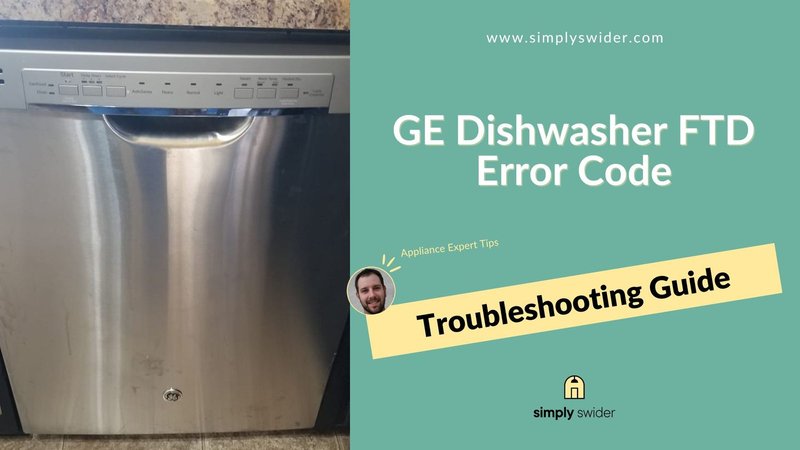
Error codes are like your dishwasher’s way of sending an SOS. They indicate something’s not quite right and help identify the issue, much like a check engine light in your car. The “HE” error code is specific to GE dishwashers and suggests a problem related to the heating element. This element is crucial; it helps sanitize your dishes by heating the water to a high temperature. When this component isn’t working correctly, your dishes may not be getting as clean as they should, which can lead to frustration and inconvenience.
So, what should you do when your dishwasher flashes this error code? Should you panic and start shopping for a new appliance? Not at all. It’s important to know when to call a technician and when you might be able to solve the problem on your own. Let’s delve deeper into understanding when it’s time to reach out for professional help.
Understanding the HE Error Code
The HE error code is all about the heating element of your dishwasher. Think of the heating element as the heart of your dishwasher’s cleaning process. It’s the component responsible for making sure the water is hot enough to thoroughly clean and sanitize your dishes. When the dishwasher isn’t heating the water properly, it can leave you with a pile of dirty dishes, even after the cycle is complete.
So why does this happen? There could be several reasons. It might be due to a faulty heating element that no longer heats up, similar to a burnt-out bulb that suddenly stops working. Alternatively, there might be an issue with the thermostat, which is like your dishwasher’s thermometer. If it’s not reading the temperature correctly, it might not trigger the heating element at the right time.
Another possibility is a problem with the wiring or connections. Just as a loose wire might make your lamp flicker, if there’s a disruption in the electrical flow to the heating element, it won’t function correctly. Understanding these potential causes can help you gauge the severity of the problem and determine the best course of action.
When To Attempt Fixing It Yourself
Before you immediately call a technician, there are a few things you might consider checking yourself. With a little patience, you might be able to troubleshoot some minor issues. Start by ensuring that the dishwasher is receiving power and that there’s no tripped circuit breaker. A lack of power could cause the heating element not to work, just like a dead battery in a remote.
You can also inspect the connections around the dishwasher’s heating element. With the power off, carefully check if any wires are loose or disconnected. Loose wires are like those annoying laptop chargers that only work if positioned just right. If everything seems to be in place, try resetting the dishwasher. Sometimes, a simple reboot — much like restarting your computer when it’s acting up — can clear minor glitches.
However, it’s essential to know your limits. If you’re feeling unsure about handling electrical components or if these inspections don’t resolve the error code, it may be time to call in a professional. Safety should always come first, and dealing with electricity requires careful handling.
When To Call a Technician
Calling a technician is a wise decision when the problem persistently flashes or if you’re uncomfortable dealing with electrical components. They’re the experts who have the tools and knowledge to dive deeper into the issue. For instance, if the heating element needs replacing, a technician can ensure that the right part is used and everything is installed correctly.
Moreover, if the problem is with the thermostat or a more complex electrical issue, a technician can perform the necessary diagnostic tests to pinpoint the root cause. This approach is like getting a doctor’s opinion when you’re feeling unwell — it ensures that the problem is addressed properly and reduces the risk of further complications.
Additionally, a technician’s expertise can save you time and further hassle. Attempting to fix the problem yourself without the right knowledge might lead to additional issues, much like attempting a DIY project without instructions. By calling a professional, you ensure that the fix is done efficiently and effectively, helping your dishwasher return to normal operation sooner.
Preventative Tips
Once the issue is resolved, consider taking steps to prevent future occurrences. Regular maintenance can go a long way. Run your dishwasher on a hot cycle occasionally to keep the heating element in good condition, much like exercising to keep your heart healthy.
Also, ensure your dishwasher is installed correctly and that it’s receiving adequate power. Sometimes, improper installations can lead to repeated issues. Lastly, periodically inspect your dishwasher for any signs of wear and tear, such as frayed wires, and address them promptly.
By keeping an eye on these aspects, you can help extend the life of your dishwasher and minimize the chances of encountering the HE error code again. In the end, knowing when to call a technician and when to manage the issue yourself can save you time, stress, and money, ensuring that your dishwasher continues to serve you well for years to come.